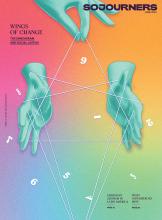HBO’S BIGGEST POST-APOCALYPTIC SHOW, The Last of Us, imagines a brutal world — and the mushroom zombies are only occasionally the source of danger. The first season followed Joel (Pedro Pascal), as he escorted teen Ellie (Bella Ramsey), who is immune to the zombie infection, to a hospital that can turn her immunity into a cure. In the final episode [SPOILERS], Joel and Ellie reach their destination. But when Joel learns they can only manufacture the cure by killing Ellie, he kills the doctor who was set to operate on Ellie. Joel’s decision raises the question: If the world can only be saved by sacrificing the innocent, is it a world we want to save? The Last of Us, itself an adaptation of a beloved video game, is far from the first show that employs apocalypse to interrogate our morality. Our end-time imaginings can show us who we are ... and who we could be.
The Greek title of the last book in the New Testament canon is Apokalypsis (“apocalypse”), the best English rendering of which is “revelation.” Revelation isn’t about the end of the world. It’s about a revelation — an unveiling. Revelation is one example from the genre of books we call apocalyptic literature. The genre, popular among Jews and Christians for hundreds of years before and after Jesus’ life, usually features a human receiving a message from some sort of divine messenger. The messenger wants to show the listener some deeper truth about the world — something that helps the audience participate more faithfully in the new world God is bringing forth.
Read the Full Article

